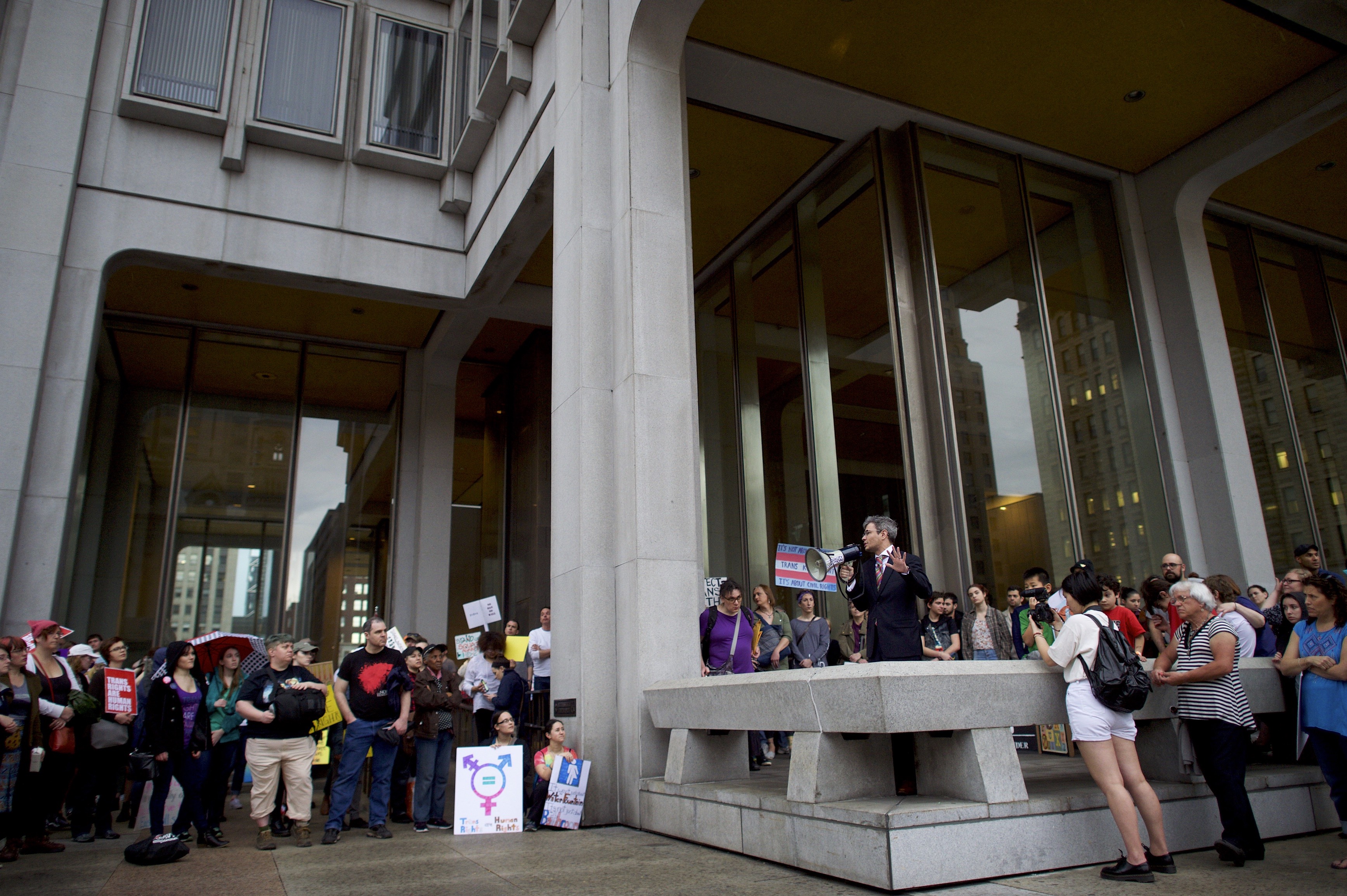
Henry Sias: From the immigration system to running for judge
A criminal lawyer's journey through life, with the ups and downs of the immigration system and the challenges of making the world see beyond his gender.
I am a 43-year-old criminal lawyer, who loves all things carbs, enjoys hockey (even though I worry about concussions), and just hosted his first Thanksgiving dinner this year with no turkey but very good brisket, with his super cool and smart wife, Carey.
I was born and raised in Detroit. When I was young I thought I was going to be a novelist, so that's what I went to Western Michigan University for.
I come from a family of more modest means, and was raised by a single mom, so I promised myself that I was going to treat college like a job, and I took that statement very seriously.
During my freshman year I had the luxury and luck to not have to work, but the other years I went to school full time and worked at a library, a bike shop for a while, and projected movies on the weekends. I took as many jobs as I could and didn't really party much.
When I graduated, the possibilities seemed endless, but it was one of those moments where you don't really know where to go. I was too young.
I thought maybe I would get a master's in fine arts or creative writing. But when the program started, I realized it wasn't going to get me to where I needed it to be. I had to drop out.
Confusion made her nest in me and I ended up moving with my girlfriend at the time to San Francisco, hoping to find an apartment in the city with only $1,200 in our pockets, and a huge dog. Man, were we naive!
We didn't get anywhere near San Francisco. There were times when we only had enough money to eat peanut butter or rice with ketchup. But people in the LGBTQ community kind of took care of us. If not for that, I think we would've just been straight up homeless. They helped us find jobs, and an apartment.
But we were still living on the edge. One time, I became very ill to the point where I was down to 114 pounds. She had to take me to the doctor and I was diagnosed with Addison's disease.
It’s an autoimmune disorder where my body doesn't produce cortisone, meaning I can't balance my levels of salt and water properly. I was extremely dehydrated and couldn't digest anything. Somehow that experience put everything into perspective.
I am a passionate guy who really cares about fairness and can't tolerate when something is broken and it's hurting people.
We all know the system is broken and hurting people, and everybody acts like that is normal. I can't handle that. That's a big foundational motivator for me, so I decided I wanted to be a lawyer.
The whole process was nerve-wracking. You are supposed to apply to nine law programs to be safe. I applied to 16 because I didn't trust that these systems were going to respond to me.
I wasn't even going to apply to Yale, but the woman that I was dating at the time said, “You should apply, I will pay the application price if you do.”
At the time it was 60 bucks, but her faith in me was the last push I needed.
But no good deed goes unpunished, I got in, and she had to move to New Haven with me.
But when you take the 200 most ambitious, aspiring lawyers and put them in a sandbox together, things get very intense. One thing led to another, and after four years together we broke up. She lives in Wisconsin now and is still one of the most genuinely warm and brilliant people I know.
I graduated in 2005, and became a junior associate at a New York-based law firm. A year later, I was given the chance to move to Philadelphia and work at a law firm that set me up with a Supreme Court clerkship, working for now- Pennsylvania Superior Court Justice, James J. Fitzgerald.
Since then I have worked in the court system, and have clerked for two PA Superior Court Justices and two judges in the Court of Common Pleas in Philadelphia.
I have been able to make a significant difference in people's lives. There have been situations where I have been able to keep immigrants in the United States who otherwise would have been deported.
It is so unfair that some folks who have been here since they were very young are now being uprooted and dumped in countries they don't even know just because a paper says that is their “home country.” So I am very proud of every part of my job that allows me to help people stay home.
The hardest part is the impact that two things have on the system. Number one, a lack of representation for people who need it. Americans would be surprised to hear that a child can go into the immigration court and not qualify for a free attorney.
Number two, mental health. If before someone commits a crime we could address the things that put them in a more susceptible place for drug use, or criminal activity, we might be able to prevent them from getting arrested again and again and again.
These kinds of things make people lose faith in the system.
That is one of the reasons I ran for a spot in the Court of Common Pleas, because I know the judicial system so well now from having worked in it and there are so many things that it has going for it. But it's also a very old system.
After over a decade of experience, I ran for judge twice. The first time was in 2017, and I knew I wasn't likely to win or get much traction with the political system because I had been working as a law clerk for so long that not a single ward leader knew my name. But it was a good way to get to know people and to start the conversation.
RELATED CONTENT
The second time was this year, and I learned a lot. I did not draw a great ballot position, but we still gave it all we could.
To be honest, there are some aspects of running for office that I don't particularly enjoy. It is very stressful, very physically demanding. But I wanted to kind of get started on some conversations, kind of like what this series of articles is doing, where I could introduce the idea that yes, I am a trans man, but I am much more than that.
It can be quite hard trying to campaign while making everyone aware of my gender identity. Everyone reacts differently, but sometimes men voters get awkward after they learn I am trans, and women voters think I can’t understand or relate with problems. But I do, because I have experienced those things.
Overall, I think it was important to know that I am a transgender man and have firsthand shared some of their experiences. I think sometimes people treat me with more respect when they learn my story.
But you know someone who has loved, supported me and seen me for more than my gender identity?
A super cool woman named Carey, who I married in 2013. When I met her, she was working as a librarian—now she does more computer systems stuff.
I needed to look up an old immigration regulation that had already expired. In my mind, I was just going to the front desk for help, but when I saw her, man was I stunned! We didn't start dating until about a year later, and I am not going to say it was love at first sight, but definitely a very notable impact at first sight.
On our first date, we talked for so long that we didn't even realize the restaurant was ready to close.
I love so many things about her. Her sense of humor, her calm in the middle of the storm, how she never loses her cool—she is unflappable.
I love everything about her, even the things that can get on my nerves at times. Like how neat she is to the point where she can't even relax on a Friday night unless the house is clean. But it all goes away with her smart comments and her amazingness.
She is my favorite person, and the owner of my favorite memory, the day I proposed. We were on a lake with Carey's family. My family is not a part of my life, but her family is made up of really cool people who are very supportive of us as a couple. I felt lucky to be with her and extremely glad to be included in a family.
Family is important for the development of individuals in society, but every family is different and sometimes the people who are supposed to love you unconditionally can't do it.
My mom is a Southern Baptist. She figured out how to relate to me when she thought of me as a lesbian, but not as a man.
I would be lying if I said I didn't miss the inside jokes, talking about memories of relatives that we have loved and lost, discussing politics (even though we never really agree on it), spending the holidays together and watching football with her.
Fun fact, one nice thing about being from Detroit is that the very invested Philadelphia football fans don't really have any rivalry with the Detroit Lions. Whenever the conversation comes up, people are always like, “Oh, honey!”. Americans, in general, are rooting for Detroit, because it’s been a while since they won.
Anyway, I have been lucky to find good friendships, an amazing wife with a great family, and slowly but surely build my own home.
For now, I will keep focusing on my work and what I can do to help people around me, while trying to be the best husband Carey deserves.











LEAVE A COMMENT: